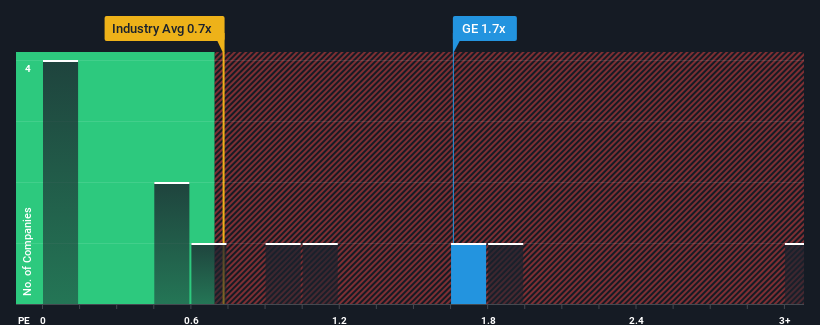- United States
- /
- Aerospace & Defense
- /
- NYSE:GE
General Electric Company (NYSE:GE) Investors Are Less Pessimistic Than Expected

When close to half the companies in the Industrials industry in the United States have price-to-sales ratios (or "P/S") below 0.6x, you may consider General Electric Company (NYSE:GE) as a stock to potentially avoid with its 1.7x P/S ratio. Although, it's not wise to just take the P/S at face value as there may be an explanation why it's as high as it is.
View our latest analysis for General Electric

What Does General Electric's P/S Mean For Shareholders?
Recent times have been advantageous for General Electric as its revenues have been rising faster than most other companies. It seems the market expects this form will continue into the future, hence the elevated P/S ratio. You'd really hope so, otherwise you're paying a pretty hefty price for no particular reason.
If you'd like to see what analysts are forecasting going forward, you should check out our free report on General Electric.How Is General Electric's Revenue Growth Trending?
In order to justify its P/S ratio, General Electric would need to produce impressive growth in excess of the industry.
Taking a look back first, we see that the company grew revenue by an impressive 36% last year. Although, its longer-term performance hasn't been as strong with three-year revenue growth being relatively non-existent overall. Therefore, it's fair to say that revenue growth has been inconsistent recently for the company.
Looking ahead now, revenue is anticipated to slump, contracting by 0.5% each year during the coming three years according to the analysts following the company. Meanwhile, the broader industry is forecast to expand by 3.9% per year, which paints a poor picture.
With this information, we find it concerning that General Electric is trading at a P/S higher than the industry. It seems most investors are hoping for a turnaround in the company's business prospects, but the analyst cohort is not so confident this will happen. There's a very good chance these shareholders are setting themselves up for future disappointment if the P/S falls to levels more in line with the negative growth outlook.
What Does General Electric's P/S Mean For Investors?
Using the price-to-sales ratio alone to determine if you should sell your stock isn't sensible, however it can be a practical guide to the company's future prospects.
For a company with revenues that are set to decline in the context of a growing industry, General Electric's P/S is much higher than we would've anticipated. Right now we aren't comfortable with the high P/S as the predicted future revenue decline likely to impact the positive sentiment that's propping up the P/S. This places shareholders' investments at significant risk and potential investors in danger of paying an excessive premium.
Before you take the next step, you should know about the 6 warning signs for General Electric (2 can't be ignored!) that we have uncovered.
If these risks are making you reconsider your opinion on General Electric, explore our interactive list of high quality stocks to get an idea of what else is out there.
New: Manage All Your Stock Portfolios in One Place
We've created the ultimate portfolio companion for stock investors, and it's free.
• Connect an unlimited number of Portfolios and see your total in one currency
• Be alerted to new Warning Signs or Risks via email or mobile
• Track the Fair Value of your stocks
Have feedback on this article? Concerned about the content? Get in touch with us directly. Alternatively, email editorial-team (at) simplywallst.com.
This article by Simply Wall St is general in nature. We provide commentary based on historical data and analyst forecasts only using an unbiased methodology and our articles are not intended to be financial advice. It does not constitute a recommendation to buy or sell any stock, and does not take account of your objectives, or your financial situation. We aim to bring you long-term focused analysis driven by fundamental data. Note that our analysis may not factor in the latest price-sensitive company announcements or qualitative material. Simply Wall St has no position in any stocks mentioned.
About NYSE:GE
General Electric
General Electric Company, doing business as GE Aerospace, designs and produces commercial and defense aircraft engines, integrated engine components, electric power, and mechanical aircraft systems.
Excellent balance sheet and fair value.
Similar Companies
Market Insights
Community Narratives




